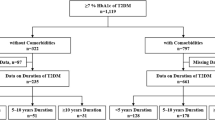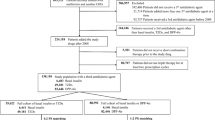Abstract
Aim
Basal insulin and DPP4 inhibitors are both possible options in patients with type 2 diabetes failing to oral drugs. The identification of clinical predictors of success with either one of the two approaches could be of help in personalizing therapy.
Methods
The retrospective study was performed on a consecutive series of patients with type 2 diabetes (n = 1,002) failing to at least one oral agent, who had been prescribed either basal insulin or DPP4 inhibitors in the previous 2 years, with a duration of follow-up of at least 6 months. Clinical predictors of success after 6 months from the beginning of second-line treatment were identified in the cohort.
Results
Among patients receiving a prescription of basal insulin, the proportion of therapeutic success at 6 months was 26.5 %. At multivariate analysis, a higher age and BMI, and a lower duration of diabetes were associated with success, as well as treatment with acarbose; conversely, a history of ischemic heart disease was associated with failure. Prescription of DPP4 inhibitors produced a therapeutic success in 24.8 % of cases. At multivariate analysis, success was associated with a lower baseline HbA1c and duration of diabetes, and a higher BMI and comorbidity; in addition, a lower success rate was found in women after adjusting for other confounders.
Conclusions
The present data support the view that insulin treatment is preferable in patients with severe hyperglycemia, failing to one or more drugs, whereas DPP4 inhibitors appear to be more useful in those with comorbid conditions.

Similar content being viewed by others
References
Inzucchi SE, Bergenstal RM, Buse JB, Diamant M, Ferrannini E, Nauck M, Peters AL, Tsapas A, Wender R, Matthews DR (2012) Management of hyperglycemia in type 2 diabetes: a patient-centered approach. Position statement of the American diabetes association (ADA) and the European association for the study of diabetes (EASD). Diabetes Care 35:1364–1379
Rys P, Wojciechowski P, Rogoz-Sitek A, Niesyczyński G, Lis J, Syta A, Malecki MT (2015) Systematic review and meta-analysis of randomized clinical trials comparing efficacy and safety outcomes of insulin glargine with NPH insulin, premixed insulin preparations or with insulin detemir in type 2 diabetes mellitus. Acta Diabetol. doi:10.1007/s00592-014-0698-4
Monami M, Marchionni N, Mannucci E (2008) Long-acting insulin analogues versus NPH human insulin in type 2 diabetes: a meta-analysis. Diabetes Res Clin Pract 81:184–189
Kim SC, Glynn RJ, Liu J, Everett BM, Goldfine AB (2014) Dipeptidyl peptidase-4 inhibitors do not increase the risk of cardiovascular events in type 2 diabetes: a cohort study. Acta Diabetol 51:1015–1023
Monami M, Ahrén B, Dicembrini I, Mannucci E (2013) Dipeptidyl peptidase-4 inhibitors and cardiovascular risk: a meta-analysis of randomized clinical trials. Diabetes Obes Metab 15:112–120
Scirica BM, Bhatt DL, Braunwald E, Steg PG, Davidson J, Hirshberg B, Ohman P, Frederich R, Wiviott SD, Hoffman EB, Cavender MA, Udell JA, Desai NR, Mosenzon O, McGuire DK, Ray KK, Leiter LA, Raz I (2013) SAVOR-TIMI 53 steering committee and investigators. Saxagliptin and cardiovascular outcomes in patients with type 2 diabetes mellitus. N Engl J Med 369:1317–1326
White WB, Cannon CP, Heller SR, Nissen SE, Bergenstal RM, Bakris GL, Perez AT, Fleck PR, Mehta CR, Kupfer S, Wilson C, Cushman WC, Zannad F (2013) EXAMINE investigators. Alogliptin after acute coronary syndrome in patients with type 2 diabetes. N Engl J Med 369:1327–1335
Charlson M, Szatrowski T, Peterson T, Gold J (1994) Validation of a combined comorbidity index. J Clin Epidemiol 47:1245–1251
Brewster LM, Seedat YK (2013) Why do hypertensive patients of African ancestry respond better to calcium blockers and diuretics than to ACE inhibitors and β-adrenergic blockers? A systematic review. BMC Med 11:141
Kasichayanula S, Liu X, Pe Benito M, Yao M, Pfister M, LaCreta FP, Humphreys WG, Boulton DW (2013) The influence of kidney function on dapagliflozin exposure, metabolism and pharmacodynamics in healthy subjects and in patients with type 2 diabetes mellitus. Br J Clin Pharmacol 76:432–444
Esposito K, Chiodini P, Capuano A et al (2014) Baseline glycemic parameters predict the hemoglobin A1c response to DPP-4 inhibitors : meta-regression analysis of 78 randomized controlled trials with 20,053 patients. Endocrine 46:43–51
Lim S, An JH, Shin H, Khang AR, Lee Y, Ahn HY, Yoon JW, Kang SM, Choi SH, Cho YM, Park KS, Jang HC (2012) Factors predicting therapeutic efficacy of combination treatment with sitagliptin and metformin in type 2 diabetic patients: the COSMETIC study. Clin Endocrinol (Oxf) 77:215–223
Monami M, Cremasco F, Lamanna C, Marchionni N, Mannucci E (2011) Predictors of response to dipeptidyl peptidase-4 inhibitors: evidence from randomized clinical trials. Diabetes Metab Res Rev 27:362–372
UK Prospective Diabetes Study (UKPDS) Group (1998) Effect of intensive blood-glucose control with metformin on complications in overweight patients with type 2 diabetes (UKPDS 34). Lancet 352:854–865
Stamou SC, Nussbaum M, Carew JD, Dunn K, Skipper E, Robicsek F, Lobdell KW (2011) Hypoglycemia with intensive insulin therapy after cardiac surgery: predisposing factors and association with mortality. J Thorac Cardiovasc Surg 142:166–173
Acknowledgments
The study was supported by an unrestricted Grant from Sanofi.
Conflicts of interest
Matteo Monami has received speaking fees from Astra Zeneca, Bristol Myers Squibb, Merck, Novartis, Novo Nordisk, Sanofi, Boehringer Ingelheim, Eli-Lilly, and Takeda. Benedetta Ragghianti, Nreu Besmir, Stefania Zannoni, and Valentina Vitale have no conflicts of interest to declare. Edoardo Mannucci has received consultancy fees from Merck and Novartis, speaking fees from Astra Zeneca, Bristol Myers Squibb, Merck, Jansen, Novo Nordisk, Sanofi, Boehringer Ingelheim, Eli-Lilly, and Novartis, and research grants from Merck, Novartis, and Takeda.
Ethical standard
All procedures performed in studies involving human participants were in accordance with the ethical standards of the institutional and/or national research committee and with the 1964 Helsinki declaration and its later amendments or comparable ethical standards.
Human and Animal Rights disclosure
All procedures followed were in accordance with the ethical standards of the responsible committee on human experimentation (institutional and national) and with the Helsinki Declaration of 1975, as revised in 2008 (5).
Author information
Authors and Affiliations
Corresponding author
Additional information
Managed by Antonio Secchi.
Rights and permissions
About this article
Cite this article
Monami, M., Ragghianti, B., Zannoni, S. et al. Identification of predictors of response to basal insulin and DPP4 inhibitors in patients with type 2 diabetes failing to other therapies. Acta Diabetol 53, 35–40 (2016). https://doi.org/10.1007/s00592-015-0732-1
Received:
Accepted:
Published:
Issue Date:
DOI: https://doi.org/10.1007/s00592-015-0732-1




